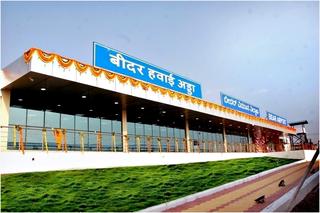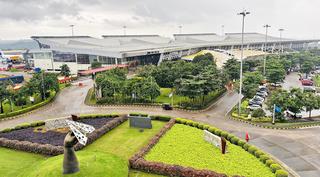Kalaburagi, a rapidly developing district in Karnataka, has once again come under the spotlight after Lok Sabha member Radhakrishna Doddamani appealed for the urgent restoration of air services at Kalaburagi Airport. His plea has rekindled conversations about regional accessibility, economic opportunity, and the future of air connectivity across northern Karnataka. The demand also reflects deeper sentiments among local residents and businesses, who view the airport not simply as an infrastructure project but as a key symbol of regional aspiration and mobility.
Local businesses remain cautiously optimistic that policymakers will act with urgency, especially as neighbouring districts continue receiving infrastructural upgrades that indirectly redirect investment away from Kalaburagi. Merchants say stable air connectivity is crucial to revive regional commerce stalled by slower transport chains. Traders dealing in consumer durables observe that shipping consignments now takes far longer, causing delays in stock rotation and raising costs for both sellers and customers. Many assert that competitors in better-connected cities now enjoy an edge, prompting some entrepreneurs to consider relocation. Such shifts, they warn, could gradually weaken Kalaburagi’s market vitality and future competitiveness.
Tourism operators recall the brief period when flight services operated smoothly, bringing a noticeable uptick in hotel occupancy and heritage tourism. In particular, historical sites, religious centres, and craft clusters benefitted from improved accessibility. Now, with flight cancellations persisting, tour operators struggle to maintain itineraries. Many travellers prefer altering their plans rather than undertaking long road journeys over uncertain terrain. Guides and small hospitality enterprises report that inquiries have dropped significantly, undercutting their revenue. They believe resuming air travel could help restore momentum while supporting livelihoods built around the tourism ecosystem.
Student organisations have voiced their frustrations, emphasising that efficient connectivity is essential for higher education opportunities outside the district. Many students seek coaching, conferences, interviews, and workshops in cities like Bengaluru, Pune, Hyderabad, and Mumbai. With airports non-operational, they now spend substantial time on road travel, sometimes missing crucial events. Student leaders propose subsidised flight rates for academic travel to boost regional talent exposure. They argue that dependable air links would help position Kalaburagi as an academic hub, attracting national-level seminars and visiting faculty, elevating the region’s educational prestige.
In political circles, the demand has sparked discussions on regional balance. Policymakers acknowledge that equitable transport access is essential to reduce developmental disparities across Karnataka. The restoration of flight services is framed as a crucial step toward integrating the northern region into statewide economic networks. Several leaders believe that once operational, the airport could host structured initiatives such as investor meets, trade fairs, and academic summits. These events, they argue, could help showcase Kalaburagi’s unique capabilities and demography, attracting national and global interest.
Private sector voices are increasingly vocal about the urgency of reviving connectivity. Entrepreneurs say the airport’s revival must align with broader economic strategies—strengthening road networks, promoting industrial parks, and developing tourism circuits. Some propose that a cargo terminal could support agro-based industries, enabling farmers to export produce efficiently. Such interventions, they assert, would encourage industrial diversification and generate employment. They warn that prolonged service suspension could lead to irreversible economic drift, making it harder to re-establish Kalaburagi’s appeal in future infrastructure cycles.
Ultimately, the emotional dimension behind the demand remains deeply resonant. Families recall the pride they felt when the first flights took off, symbolising new possibilities. Students believed they could dream beyond borders; businesses felt globally connected; patients felt safer. The silence at the airport now echoes these broken expectations. For many, the restoration of flights is symbolic of hope, mobility, and equal opportunity. With community sentiment strong and collective voices rising, Kalaburagi’s citizens await definitive action. They believe that the runway remains ready, and so do their ambitions—hoping the skies will soon open once again.
Doddamani’s request highlights the growing frustration of travellers, industry stakeholders, and educational institutions that depend on swift connectivity. The suspension of commercial flights months ago dealt a major setback to business travel, medical mobility, and tourism. Many families shared that the lack of flight services forced them to undertake long road journeys to Bengaluru, Hyderabad, or Mumbai, adding hours of fatigue and increased financial burden. The call for reinstatement is thus rooted in a lived reality of inconvenience and lost economic opportunity.
The parliamentarian emphasised that the region’s development hinges on strong transport corridors, and that the airport plays a role in bridging market access and enabling global integration. Prior to the halt, commercial flights had catalysed new investments in hospitality, education, and logistics, demonstrating the transformative role air travel can play in regional cities. Now, stakeholders worry that momentum may be slipping away while neighbouring regions accelerate forward.
Economic Stakes and Societal Expectations Rise
Businesses across sectors have reiterated their support for air-service resumption. Local manufacturing units, agricultural exporters, and pharmaceutical firms say the halt has hampered timely operations. What earlier took under two hours through air now often requires a full day of travel by road. Stakeholders in the agricultural-processing sector remarked that swift transport is vital for value chains dealing with perishable goods, and the lack of flights dulls their competitive edge. Some industries considering expansion into Kalaburagi have reportedly paused plans, citing logistical uncertainty.
Education and healthcare providers have expressed similar concerns. Kalaburagi hosts several regional universities, specialised hospitals, and research institutions that rely on quick connectivity for exchange programmes, academic visits, and emergency medical transfers. The stoppage of flights has particularly affected patients who previously travelled to cities like Bengaluru and Mumbai for advanced treatments. Families now face long road travel that is physically and emotionally demanding, especially in critical cases.
Residents emphasise that the airport gave them dignity and national connectivity, allowing them to fly for work, education, and family needs without enduring long bus or car rides. The abrupt suspension raised questions among citizens about planning and accountability. Some feel the situation reflects a lack of coordinated long-term strategy for the region’s infrastructure needs.
Even travel agents say their bookings for Kalaburagi-related travel have significantly dropped, as potential visitors reroute towards neighbouring major cities. Weekend tourism—once moderately active—has almost vanished due to travel obstacles. With the winter holiday season approaching, hospitality operators worry that another cycle of losses is imminent if flight activities are not restored promptly.
Challenges, Roadblocks, and the Promise of Renewed Connectivity
Officials familiar with the situation suggest that coordination gaps between operators, viability concerns, and technical approvals may have contributed to the suspension. However, many experts believe that sustained political push and targeted economic support can quickly restore service. The Lok Sabha member’s appeal arrives at a time when both State and Union authorities are promoting regional connectivity under broader aviation schemes designed to democratise air travel.
There is hope among stakeholders that additional incentives can be offered to carriers to ensure viable operations. Some analysts also propose that the airport adopt a multi-service business model, combining commercial passenger operations with cargo and training potential. They argue that Kalaburagi can benefit from becoming a regional logistics node, which would create jobs and give airlines a stronger business case to commit long-term. The airport’s infrastructure, having once facilitated regular flights, is deemed adequate for immediate service resumption after necessary assessments.
The demand also intersects with a broader narrative around balanced development in Karnataka. Northern districts have long sought equitable infrastructure investments, and the airport is seen as critical to uplifting their prospects. For many, connectivity is not merely about travel convenience—it is about recognition, integration, and opportunity. Doddamani’s statement, therefore, carries both logistical and symbolic force.

Several local organisations have begun rallying behind the cause, with chambers of commerce preparing to submit memoranda. Some community groups are planning awareness drives to highlight the significance of air travel for the region’s future. Their campaigns focus on youth aspirations, emphasising that easy mobility is essential to higher education, new-age professions, and innovation. The younger generation, in particular, voices concern that unequal connectivity creates an uneven playing field against better-served districts.
Industry observers point out that Kalaburagi’s geographic proximity to Maharashtra and Telangana could help position it as a tri-state air hub. They argue that renewed air services have the potential to enhance cross-regional trade, cultural tourism, and intercity collaboration. The city’s historical relevance—built on rich artistic, architectural, and literary traditions—adds to its appeal, showcasing heritage tourism possibilities once seamless travel resumes.
Transport experts stress that air connectivity is no longer a luxury. For mid-sized growing cities, they say, it is a necessity drawing investment, talent, and technology. They caution that prolonged absence of commercial flights can push regions into stagnation, masking their inherent strengths and limiting their contribution to national growth. Kalaburagi’s case, they believe, offers a timely reminder of how infrastructure hiccups can ripple into social and economic losses.
The Lok Sabha member’s appeal has also encouraged renewed scrutiny of the original suspension. Citizens seek greater transparency, asking authorities to share clear timelines and explanations. They emphasise that planning for future continuity is crucial and that abrupt stoppages should be avoided. Some civil society groups argue for stronger regulatory safeguards that require operators to provide notice periods or exit plans, preventing sudden disruptions.
Ultimately, the revival of Kalaburagi Airport’s services is seen as a shared responsibility. Citizens, industrial leaders, and public representatives seem united in their belief that connectivity can unlock the region’s dormant promise. As Karnataka continues to diversify its development agenda, Kalaburagi’s hopes hinge on swift policy action and long-term vision.

For now, the sentiment in the region is clear. People want their airport back—not just as a terminal for flights, but as a gateway to opportunity. Whether for business negotiations, educational travel, cultural exchange, or medical need, air access remains central to regional empowerment. The call to restore services reflects both practical necessity and deep emotional investment. What hangs in balance is not only mobility but also morale.
The coming weeks are expected to bring greater clarity as ministries evaluate route proposals and carrier interest. If implemented thoughtfully, service resumption could reignite the economic spark that briefly illuminated the district. Kalaburagi stands ready; its people are eager to soar again, hoping their calls to the skies will soon be answered with the return of flight paths that reconnect them with the wider world.
Follow: Karnataka Government
Also read: Home | Channel 6 Network – Latest News, Breaking Updates: Politics, Business, Tech & More

